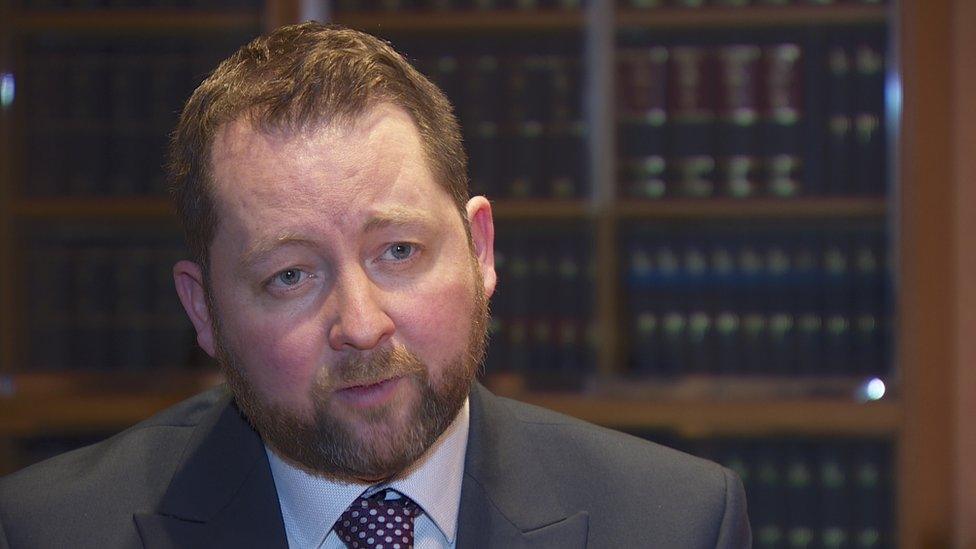NI health: Some nursing home medical bills challenged in court
- Published

Eddie Lynch is taking the case on behalf of 74-year-old Robin McMinnis
Having to pay for complex medical treatment while living in a nursing home is being challenged by Northern Ireland's commissioner for older people.
The commissioner, Eddie Lynch, is taking a judicial review on behalf of Robin McMinnis.
Mr McMinnis, 74, is paying for his medical care while living in a nursing home.
He is a quadriplegic and has complex medical needs.
Mr Lynch has been granted a judicial review to challenge the Department of Health's continuing healthcare policy.
The policy relates to the assessment of whether a person's needs can be met in a hospital which will not cost anything or is social care related which could incur costs.
The judicial review also highlights that the criteria and threshold for when a person should pay for their care is unclear and operates differently between each health trust.
All older people with assets worth more than £23,250 have to pay for their social care.
A change to the policy, introduced in February 2021, uses a single criteria question where people are asked: "Can your care needs be met properly in any other setting other than a hospital?"
For those people who are placed in a nursing home they will have to pay, others who say they cannot go to a nursing home will instead have their care paid for while in hospital.
'No natural justice'
The court was told Mr McMinnis and his wife had sold their home and his wife was living in a smaller property close to his care home.
The Belfast Trust has told the couple that half of the balance from the sale of their matrimonial home should be ringfenced as part of any financial assessment.
This had caused Mr McMinnis and his wife "significant stress" and had considerable financial implications, the court heard.
Counsel for the commissioner Fiona Doherty KC said the applicant had annual costs of more than £25,000 for his care at the Somme Nursing Home in east Belfast.
Mr McMinnis is bed-bound and only has physical movement in his head and with his eyes, which he uses to write documents through a special software package.
The court heard the Belfast Trust had allegedly mishandled his application to have his medical care paid for.
Mr McMinnis described his communication with the trust as frustrating and time-consuming at a time when his health was deteriorating.
Ms Doherty said there was "no natural justice" in how the trust had dealt with Mr McMinnis's case.
'Financial stress'
Ms Doherty said the case was "potentially significant" as it affected "people at a particularly vulnerable time in their lives, a time of great sadness and uncertainty and added to all that is the financial stress of paying for healthcare".
The judicial review is examining the impact and delivery of two health policies, the current one and its predecessor, which remains in place for applications pre-dating February 2021.
The court heard how some health professionals and charities believe the current care system is inequitable and encourages a postcode lottery.

Ms Doherty also highlighted existing legislation which draws a clear distinction between medical care and social care, and the law clearly states you should not pay for medical care but depending on personal circumstances, a person may have to pay for their social care.
Before implementing the new continuing healthcare policy, the Department of Health conducted a consultation.
At the time, Health Minister Robin Swann stressed the need to ensure that inequality issues for service users across Northern Ireland were addressed and there was regional consistency across all health and social care trusts.
"The preferred option which has emerged is to introduce a single eligibility criteria question: 'Can your care needs be properly met in any other setting other than a hospital?'
"I am confident this option will provide a clear and easily understood test and will ensure a consistent and standardised approach in continuing healthcare outcomes across Northern Ireland."
Counsel for the health trusts and the Department of Health have yet to make their case.